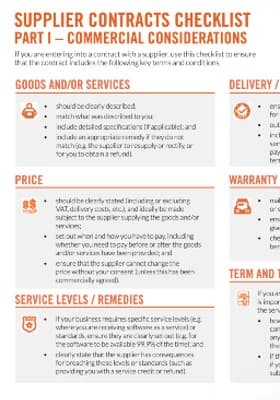Table of Contents
In the dynamic business environment of the UK, unforeseen circumstances can arise at any time, potentially disrupting operations and causing significant financial and reputational damage. To mitigate such risks, businesses must utilise robust commercial contracts. These legal agreements outline the terms and conditions of business relationships and provide vital protection against unexpected events. This article explores how commercial contracts can safeguard your business from unforeseen circumstances, detailing key clauses and best practices for contract management.
The Importance of Commercial Contracts
A commercial contract is a legally binding agreement between two or more parties that defines the terms of their business relationship. It sets out each party’s obligations, rights, and responsibilities, providing a clear framework for conducting business.
Well-drafted contracts are essential for several reasons:
- Clarity and Certainty – Contracts provide clear terms and conditions, reducing the likelihood of misunderstandings and disputes;
- Risk Management – By anticipating potential issues, contracts can include provisions to mitigate risks;
- Legal Protection – In the event of a breach, contracts offer legal recourse to ensure compliance or seek damages; and
- Professionalism – A detailed contract demonstrates professionalism and commitment to upholding business standards.
Let us explore some vital contractual clauses to address unforeseen circumstances below:
1. Force Majeure Clause
A force majeure clause protects parties from the consequences of events beyond their control, such as natural disasters, pandemics, or political unrest. This clause typically allows for suspending or terminating contractual obligations without penalty if such events occur.
To be effective, the clause should specify which events qualify as force majeure and outline the procedure for notifying the other party of a force majeure event.
The wording should also require the affected party to take reasonable steps to mitigate the impact of the event and specify the duration for which obligations can be suspended and conditions for termination if the event persists.
Continue reading this article below the formCall 0808 196 8584 for urgent assistance.
Otherwise, complete this form and we will contact you within one business day.
2. Termination Clauses
Termination clauses provide the framework for ending the contract under specified conditions. These can be crucial when unforeseen circumstances make it untenable to continue the business relationship.
This clause should allow termination if a party breaches the condition or fails to perform critical conditions.
It should also permit a party to end the contract with reasonable notice, absent blame or breach. The wording should detail the process for giving notice and any obligations during the notice period.
Finally, it should outline any responsibilities that survive the termination of the contract, such as confidentiality and non-compete clauses.
3. Liability and Indemnity Clauses
Liability and indemnity clauses allocate risk between the parties. They can limit the amount one party must pay if something goes wrong and require one party to compensate the other for specific losses.
For example, a limitation of liability clause can cap the total liability for contract breaches, excluding certain liabilities like fraud or personal injury. They can also exclude liability for specific damages, such as consequential or indirect losses.
Conversely, indemnity provisions usually require one party to indemnify the other for losses arising from specified events, such as third-party claims.
4. Dispute Resolution Clauses
Dispute resolution clauses specify how the parties can resolve disputes if they arise. These clauses can include mechanisms for negotiation, mediation, arbitration, or litigation.
Effective dispute resolution clauses should clearly state the preferred method of dispute resolution and identify the jurisdiction and venue for resolving disputes. They should also detail the procedures for initiating and conducting dispute resolution and address the allocation of dispute resolution costs between the parties.

Download this free Supplier Contracts Checklist to ensure your contracts will meet your business’ needs.
5. Confidentiality Clauses
Confidentiality clauses protect sensitive business information from being disclosed to unauthorised parties. This protection is crucial if unforeseen circumstances lead to increased scrutiny or the need to share information with external parties.
Key elements include a definition of confidential information and confirmation of the obligations of each party to protect and use confidential information. The wording should also identify any exclusions, such as information already in the public domain or disclosed by a third party.
Finally, the clause should state the duration of confidentiality obligations, which may extend beyond the contract term.
Good Contract Management
In addition to ensuring good contract wording, it is also essential to carry out effective contract management practices.
This includes periodically reviewing contracts to ensure they remain relevant and reflect current business conditions and legal requirements. A lawyer can help draft, review, and negotiate commercial contracts to ensure they provide your business with adequate protection.
Key Takeaways
Commercial contracts are vital tools for protecting your business from unforeseen circumstances. By including key clauses, you can mitigate risks and ensure your business is well-prepared for unexpected events. Coupled with good contract management, these measures will help safeguard your business interests, maintain operational continuity, and uphold your professional reputation in the UK market.
If you need legal assistance drafting commercial contracts, LegalVision’s experienced commercial contract lawyers can assist as part of our LegalVision membership. For a low monthly fee, you will have unlimited access to lawyers to answer your questions and draft and review your documents. Call us today on 0808 196 8584 or visit our membership page.
We appreciate your feedback – your submission has been successfully received.









